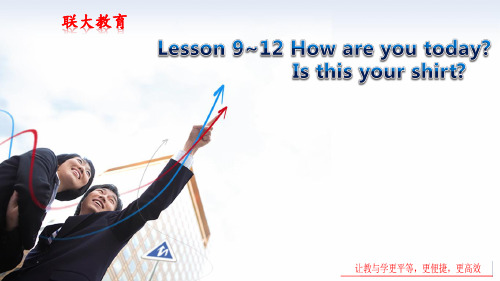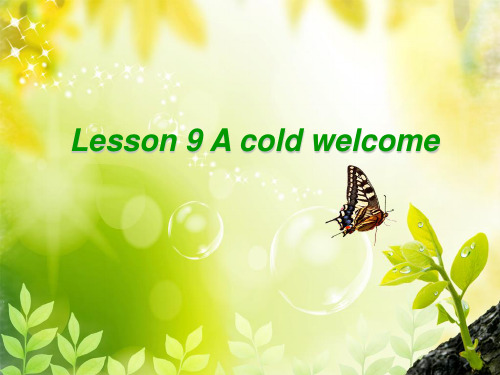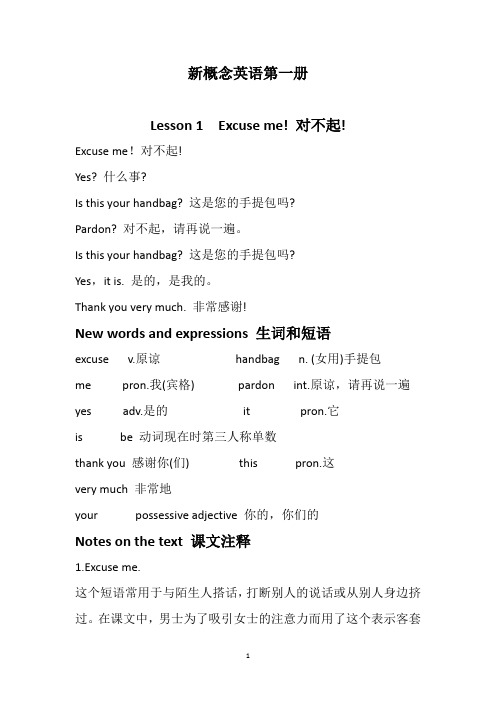新概念第一册lesson9
新概念第一册 lesson 9~12 知识点(独家教案)

Catch you later 待会儿见
Farewell 一添路加顺风内容
添加内容
Have a nice day 祝你一天过的愉快
All the best 祝一切都好
Ta ta for now 再见 Have fun 玩的开心
添加 See you later =see you 再见 内容 Good luck 祝你好运
添加
How many/ how much/how oft内e容n/ how old/ how soon/how long...
添加内容
添加 内容
II. Vocabulary
● well [wel] adj. 身体好
【用法】well表示身体好时是形容词,其它都是副词,修饰动词、形容词、其它副词。
She is every well. 她身体很好。
see off (到机场、火车站等)为某人送行
see you later= see you!再见 ❷ v. 理解、明白 I see 我明白了。
添加内容
添加内容
● thanks [θæŋks] int. 谢谢
添加
内容
Thank you/ thanks / thank you very much/ thanks a lot! /Many thanks. / Ta. = cheers!
添加
-- You’re welcome. / My pleasure. / Not at all. / That’s内al容l right.
II. Vocabulary
● 形容人(woman and man)的形容词总结
fat 胖的
thin 瘦的
tall高的
dirty 脏的 old 老的
新概念英语第一册Lesson910Howareyoutoday小学英语全国通用

Language Point
语句讲解、课文讲解
Steven (hot) Look at Steven! He's hot
Emma (cold) Look at Emma! She's cold.
Language Point
语句讲解、课文讲解
That milkman (old) Look at that milkman! He's old.
man的反义词。
Language Point
语句讲解、课文讲解
Look at that policeman! He's tall. Look at that policewoman! She's short. policeman : 男性警察 policewoman : 女性警察 tall : 长的 , 高的 short : 短的 , 矮的
查看答案解析
答案:policewoman 解析: 考查词义 policewoman n. 女警察;女警官;
语句讲解、课文讲解
同学们 , 请对照教材听老师讲解!
How are you today?
同学们 , 请做一下课堂笔记。
Language Point
语句讲解、课文讲解
how : 疑问副词,怎么样 what : 什么 e.g. What is your name? 你叫什么名字? —How are you? —I'm fine, thank you. / Fine, thank you.
Emma is very well. 艾玛很好。
Vocabulary
词汇精讲
today
adv. 今天
o : 不发 [o] 而发 [ə] 做副词 , 表示今天 e.g. I am late today. 我今天迟到了。 today作副词时 , 句中位置灵活 Today I am late. > I 始终大写
新概念英语第一册第9课课件

Sophia
Words and expressions
fat
thin
tall short
clean
dirty
hot
cold
olExercise
Listen and tell the number of the word. 1fat 2thin 3tall 4short 5dirty 6.clean 7.hot 8.cold 9.old 10.young 11.busy
T:How……? S:How is Steven?
THANKS!
数
Comprehension
T:What’s her name?
S:Helen T:How is Helen?
S:She is very well.
Asking and answering questions
1 T: Ask me if Steven is well today. S:Is Steven well today?
zy 13.see 14.Well 15.How 16fine 17goodbye 18today 19hello 20thanks
A story about greeting…
Story time
Watch the video and answer:
How is Emma?
Listening and imitation
二、Greetings. Hello ! Hi ! Good morning ! Good evening !
Good afternoon !
How are you ?
How do you do !
Nice to meet you ! Glad to meet you !
新概念英语第一册Lesson9Howareyoutoday?课件

ቤተ መጻሕፍቲ ባይዱ
She's very well, too, Helen.
她也很好, 海伦。
Goodbye, Helen. Nice to see you.
再见, 海伦。见到你真高兴。。
Nice to see you, too, Steven. Goodbye.
我见到你也很高兴,史蒂文。再见。
每天进步一点点, 进步就是好学生。
新概念英语 (第一册)
Lesson 9 How are you today?
你今天好吗?
New words and expressions
生词和短语
hello /həˈləʊ/ int. 喂(表示问候)
hi /haɪ/ int. 喂,嗨
how /haʊ/ adv. 怎样
today /təˈdeɪ/ adv. 今天
well /wel/ adj. 身体好
fine /faɪn/ adj. 美好的
thanks /θæŋks/ int. 谢谢
goodbye /ˌɡʊdˈbaɪ/ int. 再见
see /si:/ v. 见
Read the text 读课文
Hello, Helen.
你好,海伦。
Hi, Steven.
你好,史蒂文。
How are you today?
你今天好吗?
I'm very well, thank you. And you?
很好,谢谢你。你好吗?
I'm fine, thanks.
很好,谢谢。
How is Tony?
托尼好吗?
He's fine, thanks. How's Emma?
新概念英语第一册lesson9-10

Steven:Goodbye, Helen. Nice to see you.
Helen:Nice to see you, too, Steven. Goodbye.
• Nice to see you!-见到你很高兴!
见到你真高兴。 用于第二次见面或朋友之间 回答也是Nice to see you!
• 罗伯特:我是新来的学生,我的名字叫罗伯特。 • 索菲亚:很高兴见到你。我的名字叫索菲亚。 • 罗伯特:你是法国人吗? • 索菲亚:是的,我是法国人。 • 索菲亚:你也是法国人吗? • 罗伯特:不,我不是。 • 索菲亚:你是哪国人? • 罗伯特:我是意大利人。 • 罗伯特:你是老师吗? • 索菲亚:不,我不是。 • 罗伯特:你是做什么工作的? • 索菲亚:我是电脑录入员。 • 索菲亚:你是做什么工作的? • 罗伯特:我是工程师。
young/j∧ŋ/ adj. 年轻的
old /əud/ adj. 年老的
busy /'bizi/ adj. 忙碌的 a busy day忙碌的一天
lazy /'leizi/ adj. 懒的 Mary is very lazy.
• Look at… She\He\It is + adj .
• She isn’t …,She is …
fat /fæ t/ adj.胖的 short /ʃɔ:t/ adj.矮 的
['wumən] 女人
women /'wimin/
[mæ n] 男人
men /men/
/lɒŋ/ 长的 / ʃɔ:t / 短的
thin [θin] 瘦的 tall /t :l/ 高的
新概念第一册lesson9

I _____ look at the blackboard, but I can’t ______ see anything(任何东西).
主格为I I am Angela.
I
Angela is me
宾格用宾格
fat short
She He It She
He She He It
twenty-one
twenty-two
twelve
fifteen
How is he?
adj. 健康的;晴朗的;优良的 good 可通用,指各种“好”,可与nice 互 换。fine 表示“身体好”时可与well 互换 1. What a fine day! 天气真好! 2. —How are you today? 你好吗? —I'm fine, thank you. 很好,谢谢。
Look at 强调“看”这个动作;see 强调“看”这个结 果。
I look at the blackboard, but I can’t see anything(任何东西). 我看了看黑板,但是什么也没看见。
busy adj. 忙的
free
adj. 空闲的
be busy doing sth. 忙着干某事 be busy with sth. 忙着干某事 My mother is busy cooking now. 我妈妈现在正忙着做饭。 The children are busy with their homework. 孩子们忙着做作业。
新概念英语第一册第九课Lesson9

How is Tony? He's fine, thanks. How's Emma? She's very well, too, Helen.
New words:
fat
adj.胖的
woman n.女人
thin adj.瘦的
tall adj.高的
short adj.矮的
dirty adj.脏的
clean adj.干净的 hot adj.热的 cold adj.冷的 old adj.老的 young adj.年轻的 busy adj.忙的 lazy adj.懒的
她也很好,海伦。
Goodbye,Helen.再见,海伦。 Nice to see you.见到你真高兴。
H: Nice to see you, too, Steven.我见到你也很高兴,史
蒂文。
Goodbye.再见。
Language points语言点
How are you today? I'm very well, thank you. And you? I'm fine, thanks.
Lesson 9.
How are you today?
Key words:
today adv.今天 well adj.身体好的 fine adj.美好的 thanks int.谢谢 see v.看见
Text课文
S: Hello, Helen.你好,海伦
H: Hi, Steven.你好,史蒂文
S: How are you today?你今天好吗?
H: I'm very well, thank you. And you? 很好,谢谢你。你好吗?
S: I'm fine, thanks. 很好,谢
新概念英语1 Lesson 9

Lesson 9 How are you today?[词汇](9)hello int. 喂(表示问候)hi int. 喂,嗨how adv. 怎样today adv. 今天well adj. 身体好除了表示身体好时作形容词外,其它都是副词,表示做…做得好。
fine adj. 美好的除了表示身体好外还可表示天气好,主要的意思是表示细致、细腻。
thanks int. 谢谢goodbye int. 再见bye 最早表示上帝的意思。
希望你好的时候上帝与你在一起。
see v. 见, 明白see you. see you late. you see? I see.★how adv. 怎样How about that? 怎么会这样?那一个怎么样?How come?=Why? 为什么?How goes it? = How is it going? 事情进展如何?★fine adj. 美好的①健康的;舒适的②极好的,优秀的a fine view 美好的景色③优雅的,雅致的He is a man with fine manners. 他是一个举止优雅的男人。
★see v. 见see 表示看见的结果look 表示看的动作look at sth. look out of the window look into my eyeswatch 观看移动的一些东西watch TV[语法]How …?的一些社交上的用法:1、用于询问健康状况或一般生活情况:How are you? /How have you been? 你一向可好?- How are you doing? - What’s up?- I’m doing good / fine, thanks. – Nothing new. – Nothing special. [ ] 没什么,还好吧。
2、How do you do ? 是正式介绍中的一句套话,从不用来询问健康。
新概念第一册教案Lesson9-10

每日一句:An apple a day keeps the doctor away. 一日一苹果病痛远离我Lesson 9 How are you today? & Lesson 10 Look at…一.教学重点1.How are you? 句型的表达及回答2.记住形容词的句型:正反意词二.教学步骤1. 引入Good morning! 早上好~这是我们之前学习过见面打招呼可以说的第一句话,那我要是接着要开始和你聊天的话,我们可以接着怎么说呢?我们现在会说,诶,最近怎么样啊?而外国人会说How are you? 其实跟我们一样,他们也会打招呼说,你好么?而我们该怎么回答呢?听听课文就知道了。
在听课文之前,要记住我的问题哦,How is Emma?3. 课文精讲1.How are you today?你今天好吗?这是朋友或相识的人之间见面时问对方身体情况的寒暄话,一般回答语为:Fine, thank you. 很好,谢谢。
I'm fine/great, thank you. 很好,谢谢。
I'm very well, thank you. 很好,谢谢。
如果是很熟悉的朋友,大家也可以回答,Not bad。
当然,因为这属于寒暄语,所以我们就算心情很差,一般也不会直接的就说bad. 除非是极要好的朋友,你需要聊天和倾诉,也可以说not good, 朋友会追问why?,这样就产生出更多的对话。
如问及对方的先生或太太或家中其他亲属的情况,可以说How is Tony?或How's Emma?等。
相应的回答可为 He's fine,thanks 或 She's very well,thankyou等。
直接把主语换成He /She 即可。
2.And you?你好吗?是And how are you?的简略说法。
在回答对方问候健康的话之后反问时用。
3.数字21与22的英文写法21—twenty-one 22—twenty-two4. 语法要点1)How…?的一些社交上的用法how 是一个表示“如何”的疑问词,可以用来引导一些用于社交场合的套话:(1)用于询问健康状况或一般生活情况:How are you? 你好吗?How is Helen today? 海伦今天好吗?(2)How do you do?(你好吗?)是正式介绍中的一句套话,从不用来询问健康:回答也是How do you do?(3)how 经常用在询问目前状况的疑问句里,如: How's life? 生活如何?How are things? 情况怎样? How's work? 工作怎么样?2.形容词的意义与作用(1)形容词修饰名词所指的人、物等。
新概念第一册lesson9798课堂重点

新概念lesson9798课堂重点一.单词语法点:1)leave : (left, left) v. 遗留n.假期,休假短语:leave for 动身去...2)describe:v. 描述派生词descriptive adj. 描写的,叙述的短语: describe...as...把...说成...;把...称为...3)label : n.标签vt. 贴标签于be labelled with把…称为;把…列为be labelled as4)handle:n.提手,把手v. 管理,处理,对付5)address:n. 地址,演说,致词v.在...上写姓名和地址,称呼6)pence : n. penny的复数形式7)belong:v. 属于短语:belong to属于...(不能用于进行时态和被动)二.物主代词物主代词是表示所有关系的一种代词,亦称所有格。
物主代词有两种形式:形容名词性物主代词起名词的作用,后面不可以再接名词。
在句子中可以作主语,宾语或表语。
三.动词let动词let与普通动词的用法不同,后接宾语+动词原形,做宾语补足语。
如:Let him e in .I'll let you know.let us一般简写为let's ,以let's 开头的句子常用做一种委婉的祈使句。
如:Let's begin our class.四. 课文语法点1.I left a suitcase on the train to London the other day.leaveleftleftthe train to +地点the other day不久前一天,一般过去时标志词2.It's a small blue case and it’s got a zip. There’s a label on the handle with my name and address on it.形容词的位置顺序:限定描绘大长高,形状年龄和新老,颜色国籍跟材料,作用类别往后靠。
新概念英语Lesson9 a_cold_welcome

Strike ①v. 打,击 eg: It is impossible to say who struck the fatal blow. ② v. 敲,弹(钟,乐器等) strike the clock & clock strikes eg: Listen, the clock is striking three. “打” knock (at/on) knocking on heaven’s door beat drums 有规律连续地打 heart beating心脏跳动 hit 击中(the target)
Lesson 9 A cold welcome
competition [kɒmpɪ'tɪʃ(ə)n] n. 比赛,竞赛
neat [niːt]
adj. 整齐的,
n. 小路,小径
path [pɑːθ]
wooden ['wʊd(ə)n]
adj. 木头的
n. 水池
pool [puːl]
welcome ['welkəm] hall crowd gather [hɔːl] [kraʊd] ['gæ ðə]
然后,我会在寂静中等待,
Until you come and sit awhile with me.
直到你的到来,并与我小坐片刻。
You raise me up
注意: 当所有动词只表示一个短暂的动作(如finish,leave)时, 则只在否定句中用until: eg: We are not going anywhere until you spill your guts. 你不说清楚你的鬼主意我们哪儿儿都不去。 Vampire Dairies
v. 笑
laugh
新概念英语第一册Lesson912课堂重点

Lesson912课堂重点一、How引导的特殊疑问句How 提问身体状况;交通工具;如何;怎样;How are you ?I am fine / very well / great / not too badHow is Tony ?He is+fine / very well / great / not too badHow do you go to school?I go to school by bus.二、特殊疑问句提问谁的Whose提问谁的结构:Whose+名词+一般疑问句Whose shirt is that?/Whose books are those?Whose+一般疑问句Whose is that shirt?/Whose are those books?回答:It’s+名词所有格/名词性物主代词/形代+名词It’s Tim’s./It’s hers./It’s my shirt.They are+名词所有格/名词性物主代词/形代+名词They are Mary’s./They are mine./They are her books.三、形容词的用法1)形容词+名词a nice person\a beautiful girl2)Be+形容词I am good.It is interesting四、感谢用语thanks 谢谢thank youthank sb感谢某人Thanks a lot非常感谢Thank you very much五、名词所有格(表示所属关系)~的1)名词所有格’s’s表示所有关系归谁所有在谁后面加’s,译为“的”Mary’s玛丽的Your father’s你父亲的以s结尾的复数加’students’学生们的2)A’s and B’s A的和B的,分别所属,两个,谓语动词用复数A and B’s A和B的,共同所属,一个,谓语动词用单数3)“名词1+of+名词2”名词2的名词1A of B译为B的A4)双重所有格有两种形式:①of+名词所有格;Eg:He is a friend of my brother's.②of+名词性物主代词。
新概念英语课文原文:Lesson9Acoldwelcome

⽆忧考新概念频道为⼤家整理的新概念英语课⽂原⽂:Lesson 9 A cold welcome,供⼤家参考。
更多阅读请查看本站频道。
Lesson 9 A cold welcome冷遇First listen and then answer the question.听录⾳,然后回答以下问题。
What does 'a cold welcome' refer to?On Wednesday evening, we went to the Town Hall. It was the last day of the year and a large crowd of people had gathered under the Town Hall clock. It would strike twelve in twenty minutes' time. Fifteen minutes passed and then, at five to twelve, the clock stopped. The big minute hand did not move. We waited and waited, but nothing happened. Suddenly someone shouted. 'It's two minutes past twelve! The clock has stopped!' I looked at my watch. It was true. The big clock refused to welcome the New Year. At that moment, everybody began to laugh and sing.New words and expressions ⽣词和短语welcome n. 欢迎;v. 欢迎crowd n. ⼈群gather v. 聚集hand n. (表或机器的)指针shout v. 喊叫refuse v. 拒绝laugh v. 笑参考译⽂星期三的晚上,我们去了市政厅。
新概念英语第一册 Lesson9 How are you today?

对应词
• fat---thin • tall---short • dirty---clean • hot---cold • old---young • busy---lazy • man---woman
练习
• • • • • • • 举例: 1.Hellen/well Loot at Hellen.She's very well. 看海伦。她很好。 2.man/fat Look at that man.He's very fat. 看那个人。他很胖。
lesson10 look at...
fat
thin
tall short
clean
dirty
hot
cold
old
young
busy
lazy
New text
• • • • • • 1.Look at that man.He is fat. 看那个人。他很胖。 2.Look at that woman.She is thin. 看那个女人。她很瘦。 3.Look at that policeman.He is tall. 看那个警察。他很高。
• Steven:How is Tony? • Helen:He's fine,thanks. How's Emma? • Steven:She's very well,too,Helen.
• Sven:Goodbye,Helen. Nice to see you. • Helen:Nice to see you,too,Steven. • Goodbye.
• 11.Look at that hairdresser.He is busy. • 12.Look at that housewife.She is lazy. • 1.女: 主语she(她) 男:主语he (他) 其他:it(它)
新概念英语第一册Lesson9-10笔记(语法点+配套练习+答案)

1、单词分类;
int.
adv.
adj.
v.
hello
hi
thanks
goodbye
how
today
well
fine
see
2、课文复习
三、课文重点
重点
练习
look at sb. / sth.看(强调动作)
see sb. / sth.看到(强调结果)
__Look at___that dog!快看那条狗!
He isfine.对划线部分提问:How is he?
She isvery well.对划线部分提问:How is she?
3.与how有关的特殊疑问词
how old
多大(年纪)
how many
多少(可数)
how far
多远
how tall
多高
how much
多少(不可数)
how often
多久一次
4.句型转换
肯:The man isbusy.
否:The man is not busy.
一疑:Is the man busy?
答:Yes, he is. / No, he isn’t.
特:How is the man?
5.选择题
肯:The box isheavy.
否:The box is not heavy.
表语:用来描述主语状态或特征,名词或形容词可做表语
She is tall.
He is thin.
We are young.
It is happy.
The man is strong.
新概念英语第一册课文原文Lesson 1-Lesson 9(中英文)

新概念英语第一册Lesson 1 Excuse me! 对不起!Excuse me!对不起!Yes? 什么事?Is this your handbag? 这是您的手提包吗?Pardon? 对不起,请再说一遍。
Is this your handbag? 这是您的手提包吗?Yes,it is. 是的,是我的。
Thank you very much. 非常感谢!New words and expressions 生词和短语excuse v.原谅handbag n. (女用)手提包me pron.我(宾格) pardon int.原谅,请再说一遍yes adv.是的it pron.它is be 动词现在时第三人称单数thank you 感谢你(们) this pron.这very much 非常地your possessive adjective 你的,你们的Notes on the text 课文注释1.Excuse me.这个短语常用于与陌生人搭话,打断别人的说话或从别人身边挤过。
在课文中,男士为了吸引女士的注意力而用了这个表示客套的短语。
2.Pardon?全句为I beg your pardon. 意思是请求对方把刚才讲过的话重复一遍。
Lesson 3 Sorry, sir. 对不起,先生。
My coat and my umbrella please. 请把我的大衣和伞拿给我。
Here is my ticket. 这是我(寄存东西)的牌子。
Thank you, sir. 谢谢,先生。
Number five. 是5号。
Here's your umbrella and your coat. 这是您的伞和大衣。
This is not my umbrella. 这不是我的伞。
Sorry, Sir. 对不起,先生。
Is this your umbrella? 这把伞是您的吗?No, it isn't. 不,不是!Is this it? 这把是吗?Yes, it is. 是,是这把。
- 1、下载文档前请自行甄别文档内容的完整性,平台不提供额外的编辑、内容补充、找答案等附加服务。
- 2、"仅部分预览"的文档,不可在线预览部分如存在完整性等问题,可反馈申请退款(可完整预览的文档不适用该条件!)。
- 3、如文档侵犯您的权益,请联系客服反馈,我们会尽快为您处理(人工客服工作时间:9:00-18:30)。
thin(瘦的)
fat
(肥的,胖的)
short(矮的)
tall(高的)
short( 短的)
long(长的)
thick(厚的)
thin
(薄的)
clean(干净的)
dirty(脏的)
hot(热的)
cold(寒冷的)
hot(辣的)
young(年轻的)
old(老的)
busy(繁忙的)
Who are you?
I am Hillary’s husband.
And you?
Me too!
How are you?
What?!!!!!
I am fine, thank you.
And you? Me too!
Lesson 9 How are you today? Lesson 10 Look at…
情景交际:
----How are you today? ----I’m very well, thank you. And you? ----I’m fine, thanks.
see
v. 见
v. 理解,明白 I see. 我明白了。 see off (到机场 、火车站等)为某人送行
look at 与see
主格为I I am Angela.
I
Angela is me
宾格为me
.
me
be在后,用主格;动词,介词后面用宾格
fat short
She He It She
He She He It
twenty-one
twenty-two
twelve
fifteen
How is he?
I’m fine today. ______________ How are you today?
She is very well today. __________________ How is she today?
________have you been to China? A. How long B. How many C. How far
Unit 5
Unit 5
STEVEN: How is Tony? HELEN: He's fine, thanks. How's Emma? STEVEN: She's very well, too, Helen. STEVEN: Goodbye, Helen. Nice to see you. HELEN: Nice to see you, too, Steven. Goodbye.
She is very well. 她身体很好。
too 表示也在句尾 either表示也在否定句中 as well 表示“也”, 用于句末。 My brother will come as well. 我哥哥也会来。
Well done. 干得漂亮!
good job 干的出色
fine
adj. 美好的
What is his name?
Unit 5
,
( 3 )how ( 2 )hi ( 4 )today ( 9 ) see ( 7 )thanks ( 1 )hello
( 8 )goodbye ( 6 )fine ( 5 )well
how adv. 怎样;多少
How are you ?(问身体和状态) 你怎么样? 常用句: How much is it? How many students are there in your class?
lazy(懒惰的)
How are you today?
STEVEN: Hello, Helen. HELEN: Hi, Steven. STEVEN: How are you today? HELEN: I'm very well, thank you. And you? STEVEN: I'm fine, thanks.
The children ____________ their homework. be busy doing sth. 忙着干某事 be busy with sth. 忙着干某事
I _____ look at the blackboard, but I can’t ______ see anything(任何东西).
today
n. 今天;现在
adv. 今天
yesterday 昨天 tomorrow 明天
Tomorrow is Monday
明天星期一
Today is Sunday. 今天星期日。
well
adj. 健康的(身体好)
adv. 好地;满意地(干得好) int. (表示惊、同意、忧郁等)嗯,唉,哦
adj. 健康的;晴朗的;优良的 good 可通用,指各种“好”,可与nice 互 换。fine 表示“身体好”时可与well 互换 1. What a fine day! 天气真好! 2. —How are you today? 你好吗? —I'm fine, thank you. 很好,谢谢。
How is Tony?
He’s
fine.
How are you today?
STEVEN: Hello, Helen. HELEN: Hi, Steven. STEVEN: How are you today? HELEN: I'm very well, thank you. And you? STEVEN: I'm fine, thanks.
Unit 5
Unit 5
STEVEN: How is Tony? HELEN: He's fine, thanks. How's Emma? STEVEN: She's very well, too, Helen. STEVEN: Goodbye, Helen. Nice to see you. HELEN: Nice to see you, too, Steven. Goodbye.
Look at 强调“看”这个动作;see 强调“看”这个结 果。
I look at the blackboard, but I can’t see anything(任何东西). 我看了看黑板,但是什么也没看见。
busy adj. 忙的
free
adj. 空闲的
be busy doing sth. 忙着干某事 be busy with sth. 忙着干某事 My mother is busy cooking now. 我妈妈现在正忙着做饭。 The children are busy with their homework. 孩子们忙着做作业。
how many多少,后面总是跟可数名词的复数 how much多少,也可以问价格,价钱,后面总 是跟不可数名词 how long多长时间 how often表示“经常”,问的是频率 how far表示问距离多远 how soon问“(将来)多久”
How long have you been to China? 你在中国住了多久? How often do you come here to study English? 你多久来这学习英语一次? How soon will you come back? 你将多久回来?
